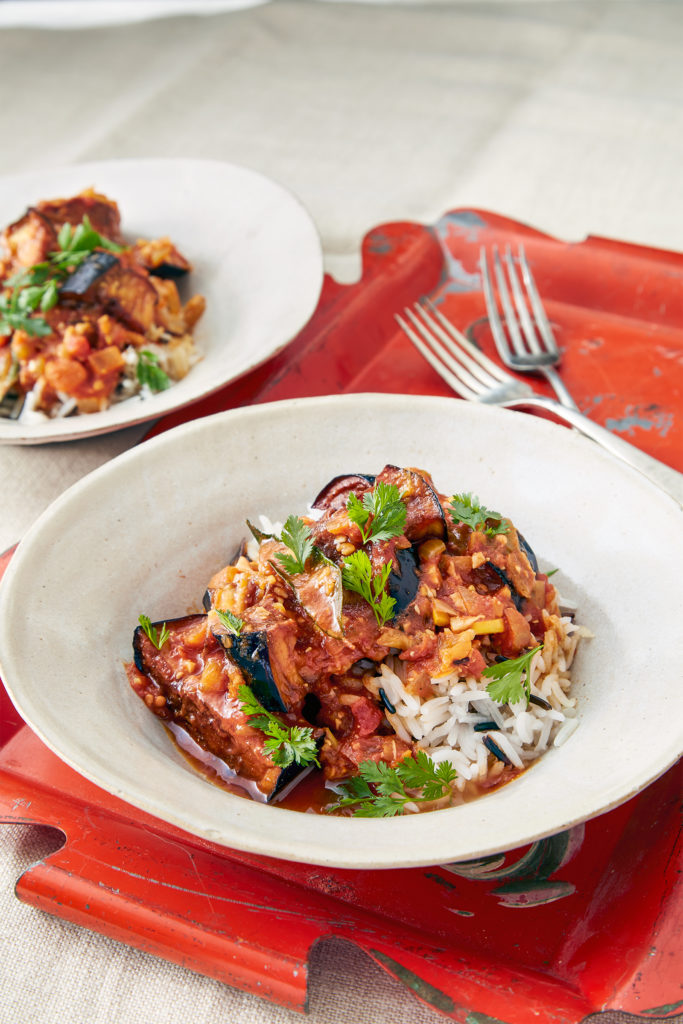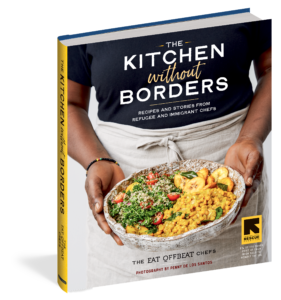Eggplant lovers, this Katarica Curry recipe is for you!
This fragrant curry features eggplants, spiced with turmeric and garnished with cilantro. Katarica Curry is an excellent choice for a cold winter evening, from Sri Lanka to your dining room! Excerpted from The Kitchen Without Borders by The Eat Offbeat Chefs with Siobhan Wallace. Copyright © 2021 by Workman Publishing. Photography © 2021 by Penny De Los Santos.

Katarica Curry
Chef Shanthini • Sri Lanka
Fried eggplant in creamy curry leaf, fenugreek, and tomato sauce. Serves 4 to 6 as a main dish.
This eggplant curry is a crowd favorite at Eat Offbeat. The eggplant slices need to sweat a bit prior to frying, which helps them crisp up better. If you have extra hands in the kitchen, the two aspects of this dish could be made simultaneously. Like most curries, this is best served over fresh basmati rice.
INGREDIENTS
2 medium eggplants (about 2 pounds), cut into 2 x 1-inch planks
2 teaspoons ground turmeric
1 tablespoon, plus 2 pinches, kosher salt
Vegetable oil, for frying
1 tablespoon fenugreek seeds
1 cup chopped yellow onion
10 curry leaves
10 garlic cloves, peeled and minced
2 tomatoes, diced
1 teaspoon chili powder
1 tablespoon ground cumin
1 tablespoon tomato paste
1 tablespoon freshly ground black pepper
2 tablespoons sugar
Cooked basmati rice, for serving
1/4 cup fresh cilantro leaves, for garnish
INSTRUCTIONS
1. Sprinkle the eggplant planks with 1 teaspoon of turmeric and 1 tablespoon of salt. Let the planks rest on a paper towel–lined plate for 15 minutes.
2. To fry the eggplant, pour vegetable oil to a depth of at least 2 inches into a large stockpot or Dutch oven and clip a candy thermometer to the side, making sure it doesn’t touch the bottom. Heat the oil to 375°F over high heat, then lower the heat to medium to maintain that temperature during frying. While the oil is heating up, line a large plate with paper towels.
3. Working in batches and using a slotted spoon, place the planks in the oil. Fry until all the sides turn golden, gently stirring, 2 to 3 minutes, and then quickly remove them with the slotted spoon. Place on the towel-lined plate. Set aside.
4. Heat the fenugreek seeds in a small dry skillet over medium heat, just until they become fragrant, about 2 minutes. Remove the seeds from the heat and grind
in a food processor or spice grinder. Set aside.
5. Heat 2 tablespoons of oil in a large pot over medium-high heat. Once the oil is hot, add the onion and sauté until lightly browned, about 5 minutes. Add the curry leaves and garlic and sauté for 5 minutes. Add the tomatoes and a pinch of salt and cook for 5 minutes. Stir in the chili powder, cumin, and remaining 1 teaspoon of turmeric, then gently fold in the eggplant planks. Stir in 1 cup of water, another pinch of salt, the tomato paste, black pepper, and ground fenugreek seeds, and continue cooking for 5 minutes more.
6. Remove the pan from the heat and stir in the sugar. Serve over rice, garnished with cilantro.
More About The Kitchen Without Borders
 Refugees By Status, Chefs By Calling
Refugees By Status, Chefs By Calling
Founded in November 2015 by a brother and sister who came to New York from the Middle East, Eat Offbeat is a unique catering company staffed by refugee and immigrant chefs who have found a new home, and new hope, for their lives. Now, in 70 authentic, nourishing recipes, with roots and soul that run as deep as their flavors, The Kitchen without Borders brings the culinary traditions of fourteen chefs from around the world including Syria, Iran, Eritrea, and Venezuela, right to our tables.
Discover delicious, unexpected flavor combinations, and ingredients—like sumac, pomegranate molasses, tahini—that will enhance the repertoire of any home cook or adventurous eater. Here is Iraqi Biryani, a rice dish combining vegetables and plump dried fruits with warming spices. Or an irresistibly cooling yogurt and fresh mint drink native to Afghanistan, known as doogh. Gorgeously smooth Syrian hummus, the original inspiration for Eat Offbeat. And Chari Bari, hand-formed meatballs simmered in a Nepali-spiced tomato and cashew sauce.
More than a celebration of delicious foods from around the world, this recipe collection—with its intimate chef profiles and photographic portraits—allows people who have been displaced to share their cherished cuisines, in their own words. And it makes a thoughtful, inspiring gift for any home cook, for anyone concerned about or affected by the world’s refugee crisis, or for anyone who understands the profound link between food, home, and keeping traditions vibrantly alive.
From March 1, 2021, to March 30, 2022, (including any preordered copies that ship during this period), Workman Publishing will donate 2% of the cover price for every copy of The Kitchen without Borders cookbook sold in the United States and its territories, the United Kingdom, Canada, Australia and European Union member states, to the IRC, a not-for-profit organization dedicated to providing humanitarian aid, relief and resettlement to refugees and other victims of oppression or violent conflict, with a minimum contribution of $25,000 USD. For more information, visit rescue.org/cookbookand https://www.workman.com/kwob. No portion of the purchase price is tax-deductible. For additional information about the IRC, see rescue.org.
Buy the Book
Amazon| B&N | Bookshop | Workman




No Comments